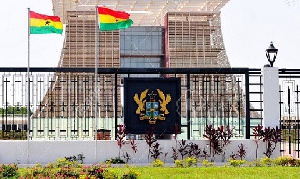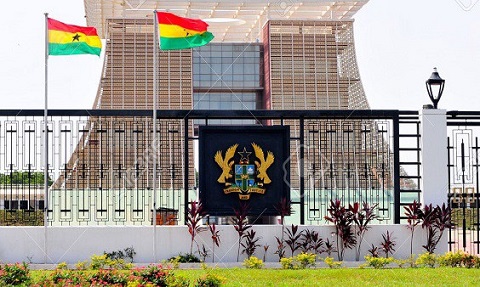 The seat of government, the Jubilee House
The seat of government, the Jubilee House
The issue of presidential staffing, a recurring topic of debate in Ghana’s political space, has once again ignited controversy, exposing what some see as blatant hypocrisy from the Minority in Parliament. Recent exchanges on the floor of the House and at a press conference have highlighted discrepancies and fueled accusations of double standards regarding the number of individuals working at the Presidency.
The debate was reignited on March 5th, 2025, when the Member of Parliament for Damongo, Hon. Samuel Abdulai Jinapor, claimed that the current National Democratic Congress (NDC) administration had already appointed over 100 political presidential staffers. This assertion, presented on the floor of Parliament, was seemingly intended to raise concerns about the size and cost of the President’s office under the new government.
However, just two days later, on March 7th, 2025, Hon. Felix Kwakye Ofosu, the Minister of State in charge of Government Communications, addressed the issue during a press conference at the Jubilee House.
Minister Ofosu vehemently denied the claims made by Hon. Jinapor, stating unequivocally that the NDC administration had, to date, appointed only 27 political presidential staffers. This stark contrast in numbers immediately raised eyebrows and fueled speculation about the accuracy and motivations behind the initial claims.
The real sting, however, lies in the stark contrast with the past. A crucial piece of evidence, a document dated March 28th, 2022, surfaced, painting a significantly different picture of the previous administration.
This document, submitted by the Presidency to the Speaker of Parliament, revealed that a staggering 337 political presidential staffers were employed under the then Akufo-Addo-led government. This detail is particularly damning for Hon. Samuel Abdulai Jinapor, who was himself a part of that administration.
The discrepancy between the claimed 100 plus staffers and the official 27 is significant enough. However, the revelation of the 337 staffer figure under the previous administration, especially considering Hon. Jinapor’s involvement, throws the accusations into sharp relief, highlighting a potential case of political opportunism and hypocrisy.
The implications of this episode are multi-faceted. It raises serious questions about the motivations behind political pronouncements. Is the goal to genuinely improve governance and accountability, or is it simply to score political points, regardless of the facts? The actions of Hon. Jinapor suggest the latter, potentially eroding public trust in the political process.
Additionally, this incident serves as a reminder of the need for citizens to critically analyse the information presented by their elected officials. In an era of readily available information, individuals must take the initiative to verify claims and demand evidence before forming opinions.
The debate surrounding presidential staffing is far from over. However, this particular episode serves as a potent example of the dangers of hypocrisy in politics and the importance of holding our leaders to account for their words and actions.
As the nation continues to grapple with issues of governance and economic development, the focus should be on fostering honest and transparent dialogue, rather than engaging in politically motivated misinformation campaigns.


